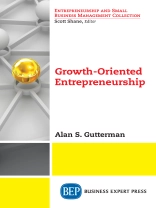This book provides an extensive introduction to research on growth-oriented entrepreneurship,
, /b>A number of different methods have been used to describe growth-oriented entrepreneurship; however, there is a consensus that there is a particularly desirable form of entrepreneurship that seeks to create and scale up businesses that will drive productivity growth, create new employment, increase innovation, promote business internationalization and achieve sustainable economic growth. Innovation is a condition of growth-oriented entrepreneurship that includes both the development and commercialization of new products and services and the development and implementation of new or improved processes that enhance productivity or reduce costs associated with manufacturing or distributing existing products. Innovation involves firms pursuing distinctive business strategies and doing new things in new ways to increase productivity, product development, sales and profitability, including finding and developing new ways of identifying the needs of new and existing customers and making and marketing products that satisfy those needs.
The goal of the launch phase for growth-oriented entrepreneurial ventures is to reach the point of scale up and common goals and activities associated with the launch phase include market disruption and penetration; gaining access to capital and markets and mentorship opportunities; organizational growth through management capacity, systems, resources (i.e., people, product and assets) management; embedding organizational culture; development of stakeholder relationships; monitoring and evaluation; and governance and reporting. This book provides an extensive introduction to research on growth-oriented entrepreneurship and continues with an assessment of attempts to create the appropriate framework conditions for growth-oriented entrepreneurship to flourish and sustain including financial support; government policies; government programs; education and training; research and development transfer; commercial and professional infrastructure; internal market openness; access to physical infrastructure; cultural and social norms; and protection of intellectual property rights. The final chapter looks at growth-oriented entrepreneurs in practice as they work to launch and growth emerging companies. This book is a unique compendium of research and analysis on a dynamic and important segment of entrepreneurship and will be useful to entrepreneurs, academics and policymakers.
Giới thiệu về tác giả
Dr. Alan S. Gutterman is the founding director of the Sustainable Entrepreneurship Project. In addition, Alan’s prolific output of practical guidance and tools for legal and financial professionals, managers, entrepreneurs and investors has made him one of the best-selling individual authors in the global legal publishing marketplace. Alan has also authored or edited over 40 books on sustainable entrepreneurship, management, business law and transactions, international law, business, and technology management for a number of publishers. Alan has over three decades of experience as a partner and senior counsel with internationally recognized law firms counseling small and large business enterprises in the areas of general corporate and securities matters, venture capital, mergers and acquisitions, international law and transactions, strategic business alliances, technology transfers and intellectual property. He received his AB, MBA, and JD from the University of California at Berkeley, a DBA from Golden Gate University, and a Ph D from the University of Cambridge.












